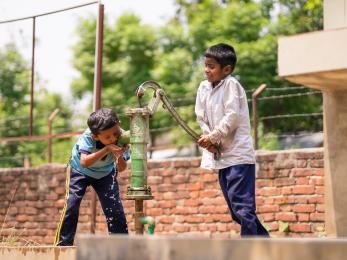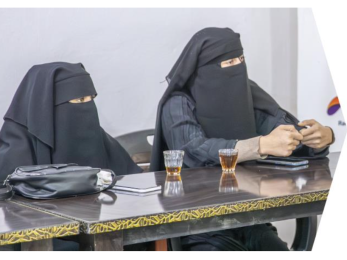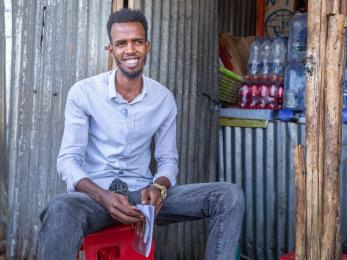Youth Transformation Framework

Mercy Corps empowers young people by building their capabilities and creating access to opportunities for engagement. We not only provide education and training relevant to social and market conditions, but also help local actors create spaces where young people can evolve and contribute meaningfully. Our Youth Transformation Framework™ (YTF), built from research across disciplines and 25 years of field experience, provides a comprehensive view of youth needs in complex transitional environments. The framework always presents both perspectives critical in youth development: the ‘demand’ for skills and behaviors (i.e. capabilities) from society and the ‘supply’ of accessible opportunities required to meet such demand.
The following diagram illustrates the six transformational assets that must be built locally in order to help young people transition into empowered and responsible global citizens. Overall, these assets comprise 75 program outcomes representing youth needs to help practitioners better identify the most important drivers of peace, productivity and justice. Such a youth lens facilitates cross-sectoral programming that optimizes future contributions to society. Because context differs, certain youth programs target 10-year olds while others focus on young adults up to 30.
Within this wide range, the identity seeking period often called “waithood” before transition to work/parenthood is critical because (1) attitudes and behaviors learnt during youth are easier to adopt; (2) likely to last a lifetime; and (3) unsatisfied needs increase vulnerability to negative influences. Engagement in violence is often triggered by simple “pull factors” which are the appeal exerted by terrorist groups or gangs. Because the importance of each need varies by individual, it is critical for youth programming to provide a diverse range of positive outlets that channel youth energy of multiple aspirations. Youth engagement in economic, civic and social activities that foster livelihoods, political participation and youth-to-youth connections can prevent risky behaviors while fostering positive youth development.
Building Youth Capabilities
To minimize the risks or consequences of conflict, poverty and injustice, young people must develop relevant knowledge, skills, attitudes and behaviors (i.e. capabilities). Unfortunately, families and schools in transitional environments are often overstretched and trapped into habitual patterns that prevent progress. Mercy Corps breaks vicious circles by building critical capabilities that fundamentally transform the way young people see their role and responsibilities in the world. Providing academic or vocational skills alone is insufficient to ensure effective transition to work or productive and respectful citizenship. Young people from poor communities also need life and soft skills to take care of their health, make informed decisions, develop relationships, solve problems, etc. Adult support from role models, coaching and encouragement are often lacking despite their importance in youth development. Enabling young people to learn, express themselves and interact in structured settings has significant impact on their self-confidence and intra-personal skills, which in turn, increases their ability to contribute productively to their development and that of their community.
Building Youth Opportunities
In developing countries, there are insufficient opportunities to develop/utilize relevant knowledge, skills, attitudes and behaviors effectively/productively. Educational institutions tend to endorse rote-learning approaches with limited open dialogue. This older approach inhibits critical thinking and creativity and stifles effective communication, leaving young people inadequately equipped to navigate through the social, political and economic realities of the 21st century. New forms of engagement are therefore required to not only channel youth energy, but also to establish the foundation for caring and productive communities. Mercy Corps creates linkages and relationships among civil society, government and the private sector to optimize synergies that benefit youth in short and long term.
The lack of employments to meet the surge in labor supply is alarming. Youth unemployment will continue to increase as the youth bulge unfolds worldwide which will aggravate helplessness, insecurity and frustrating dependency. Large youth investments must therefore be focused on creating the conditions for innovations, entrepreneurship and employment creation. Industries with high growth potential must be identified based on value chain analysis with a perspective on employment creation for young people. Bottlenecks should then be removed and the workforce prepared accordingly. Given the scope of the demographic challenge ahead, all sectors must see youth development as a strategic priority for a more productive future.
For more information, download these documents:


